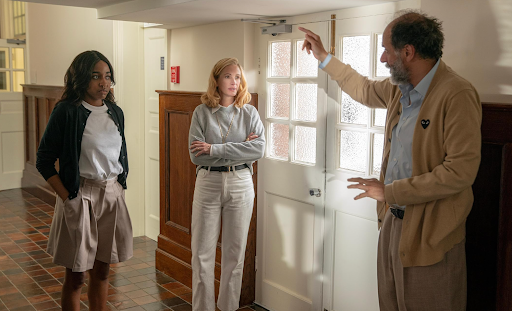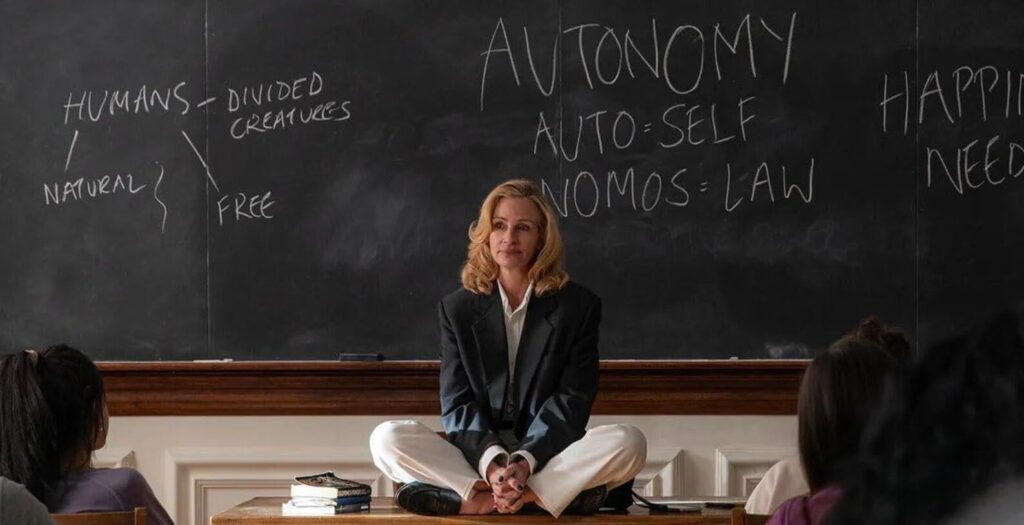“After the Hunt” Captures the Explosive Cost of Self-Deception

Content warning: mentions of sexual assault
Luca Guadagnino (“Call Me By Your Name,” “Bones and All,” “We Are Who We Are”) is known for slow-paced projects that linger in the moment. Locations are utilized as a force rather than a backdrop for the characters. In his newest work, “After the Hunt,” Guadagnino takes on the most terrifying force of all: the Ivy League campus.
The film, released on October 10th, follows Alma (Julia Roberts), a philosophy professor at Yale University, as her cherished teaching assistant Maggie (Ayo Edibiri) accuses another professor and Alma’s close friend, Hank (Andrew Garfield), of sexual assault. The tension is layered as Alma struggles to “choose a side” due to her intimate relationships with both Maggie and Hank. Meanwhile, she’s competing with Hank to get tenure as her mysterious physical illness worsens.
Guadagnino has, in the past, successfully evoked the styles of his inspirations, such as classic European filmmakers Éric Rohmer, Jean Renoir, and Bernardo Bertolucci. But some of his more recent works have lost that magic touch as the filmmaker has slowly switched from independent works to major studio projects. This switch began with the 2018 film “Suspiria,” and was later followed by the 2024 film “Challengers,” and now “After the Hunt,” which was financed by Amazon MGM Studios.
These three films are distinctly less creative than his past works, with plotlines and casting choices clearly catered to larger audiences. “After the Hunt” attempts to recreate his past slow cinematic style, but struggles without the expressionistic, sensual rhythms of his past works. It appears Guadagnino’s signature aesthetics took a back seat, as the film centers more on novice screenwriter Nora Garrett’s philosophical discourse.
Garrett’s previous works as a writer are the 2018 standard crime/thriller “Beirut,” and “Criminal Minds: Beyond Borders.” Garrett clearly comes from an entirely different world of storytelling than Guadagnino.
The film’s 2-hour-and-19-minute runtime could have been significantly cut down if there wasn’t so much empty dialogue throughout the film. The dialogue attempts to capture conversations between faculty members of Yale’s philosophy department, but ends up coming off as overly pretentious. The script is too focused on conversation rather than the progression of the film. The only purpose of the dialogue is that it reveals the performative nature of the film’s characters.
For instance, in one of the opening scenes the characters all attend a party at Alma’s, in which they discuss the problematic sides of popular philosophers. A colleague of Alma and Hank’s, Kim (Chloë Sevigny), makes the point that Freud is a misogynist, but later on is shown with an office full of books about Freud. These conversations prove that the faculty’s attempts at being progressive are simply a performance. Rather than cruelty, ignorance is the film’s modern evil.
Reminiscent of a Woody Allen film, the script consistently covers topics that many audience members won’t understand, adding to these characters’ pretentious natures. Instead of the dialogue coming off as intellectual, it falls empty and robs the story of its cohesiveness.
Guadagnino delves into new territory by making a film that is not catered to his primarily Gen-Z fanbase, with a main character constantly making stabs at #MeToo culture. In addition, Maggie is not a properly developed character, but rather a placeholder for Garrett to embody Gen-Z stereotypes. She has a septum piercing and a nonbinary partner, which are obvious shorthand choices used by Garrett to portray Gen-Z progressivism.
Viewers are prompted to question Maggie’s honesty at multiple points during the film, never revealing whether or not her claims are true. This brings upon a moral dilemma, as many young audiences were raised to believe it is wrong to doubt a victim’s claims.
A big focus of the film is the power dynamic between Maggie and Alma. In the beginning, Maggie finds an old newsletter about Alma’s own accusations against a friend of her father’s. While Alma is unaware that Maggie saw this, she remains consistently guarded, worried that her true history will be revealed.
It is implied that Maggie is obsessed with Alma, and imitates her actions as a result. As a viewer, this leads to the conclusion that Maggie made up the accusations about Hank to mimic Alma’s public claims that she was abused by her father’s friend. Ultimately the viewer is left wondering if Alma was instead jealous of Maggie and her ability to be believed without proof. Maggie had everything that Alma wanted: rich parents, a successful career path without putting in the work and a believed victimhood.

Throughout the film Alma is seen having sharp, overwhelming stomach pains, which cause her to vomit. Her symptoms worsen as the story unfolds, symbolizing both her physical and hierarchical decay.
The ticking sound of a clock, which is heard throughout the film, comes to an end when Alma collapses and is sent to the hospital. The metaphorical bomb has gone off. In a hospital scene between Alma and her husband Frederik (Michael Stuhlbarg), she reveals to him that she was never abused, claiming to have forced her father’s older friend into a relationship when she was a teenager. Frederik affirms that, even though she’d spent all this time believing she was at fault for the relationship and the issues that arose thereafter, she was truly a victim: just like Maggie, whose victimhood Alma continuously refused to accept.
The film’s aesthetics are tightly composed to mimic Alma’s put-together nature. This tenseness simply adds to the stress of the film, revealing that Alma’s situation was just a ticking time bomb waiting to erupt.
Alma’s final demise is proof that this film is not a stab at #MeToo culture, but rather an attempt to portray the faults within the system. While older generations are known for having a more difficult time believing women who claim they are victims of sexual assault, the film proves that, at the end of the day, this system of belief is meant to fail.
Every bomb must either be diffused or erupt, and it’s our choice to decide which route to take in our lives. Shall we live like Maggie, in “lukewarm warm” (as Alma calls it), or shall we live like Alma — always denying ourselves the truth, never allowing ourselves to be the victim in situations, but always the culprit?
In the end, “After the Hunt” is a film at war with itself — similar to its characters. Guadagnino’s direction can’t save the film from its emotional detachment or its shallow attempts at intellectualism. It wants to explore the cost of self-deception, but by the end the deception extends to the film itself — convinced it’s saying something profound when it’s really only circling emptiness. In trying to dissect hypocrisy, the film becomes its finest example.
Regions: Boston, New York City
